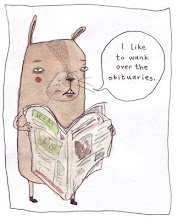
The work of Chris Ware has been blogged about to death, but I thought it at least deserves a mention here. In particular I wanted to talk about storytelling in comic books. Admittedly I've read precious few of these, usually finding them difficult or being uninterested in their content. However, a few years ago a friend gave me Jimmy Corrigan: the Smartest Kid on Earth, which turned out to be one of the most incredible books I have ever read. I could write about it for pages but I'll try to keep this short. Firstly, the story is unusual for a comic book - it tells the story of three generations of Corrigan men, centering on the story of Jimmy Corrigan's first meeting with his estranged father. It is a careful study of loneliness and crushing social awkwardness on the one hand, and on the other hand it explores ideas of paternal neglect and desertion, and the repercussions these can have down the generations of a family.
It's certainly not the easiest of reads, but I have always believed that a book isn't really worth reading unless it challenges you in some way. It should make you think, make you bang your head against a wall trying to figure out what it's about; it should make you angry, elated, amused, any or all of these things. The book has plenty of critics who find it dull, ugly or impossible to read. It is sometimes a bit self-conscious in its sidelong superhero references, or in its use of classic comic book devices to tell the story, but I think that the overall work is extraordinarily beautiful. Its very self-consciousness adds another layer of meaning to the story - at the very heart of it is Ware's inquisitiveness with regard to storytelling structures.

Great storytelling is about narrative and sequence. So firstly there must be good content but more importantly it is about the way in which the narrative is presented in time. Storytelling is made great through the thoughtful pacing of a story and the ways of telling it with imagination and dynamism. I think Jimmy Corrigan is an almost perfect exposition of these ideas - it is meticulously planned but playful and very often surprising or even baffling. There are straightforward pages laid out in a classic style, interspersed with beautiful, serene images that allow the narrative to breathe, as it were. And sprinkled throughout are these curious diversions: cut-out-and-stick houses, collectors' cards of views in Waukosha, and even a mid-way summary page (below). All of these are interwoven with occasional flashbacks, dream sequences and grotesque fantasies. There is a palpable sense of loneliness - created through the sombre colour palette and the hiccupping pacing that flows and ebbs throughout, enveloping moments of desperate quietness or crippling anxiety. I am sounding properly pretentious now, so I'll shut up. I can only recommend reading it to see what I'm harping on about.

All images from Jimmy Corrigan: the Smartest Kid on Earth by Chris Ware.

Oh, and if you want to see some wonderful animations by Chris Ware and John Kuramoto, check out the This American Life animations here and here on YouTube. They are stunning and funny all at the same time, and demonstrate the translation of these storytelling ideas into moving image.









No comments:
Post a Comment